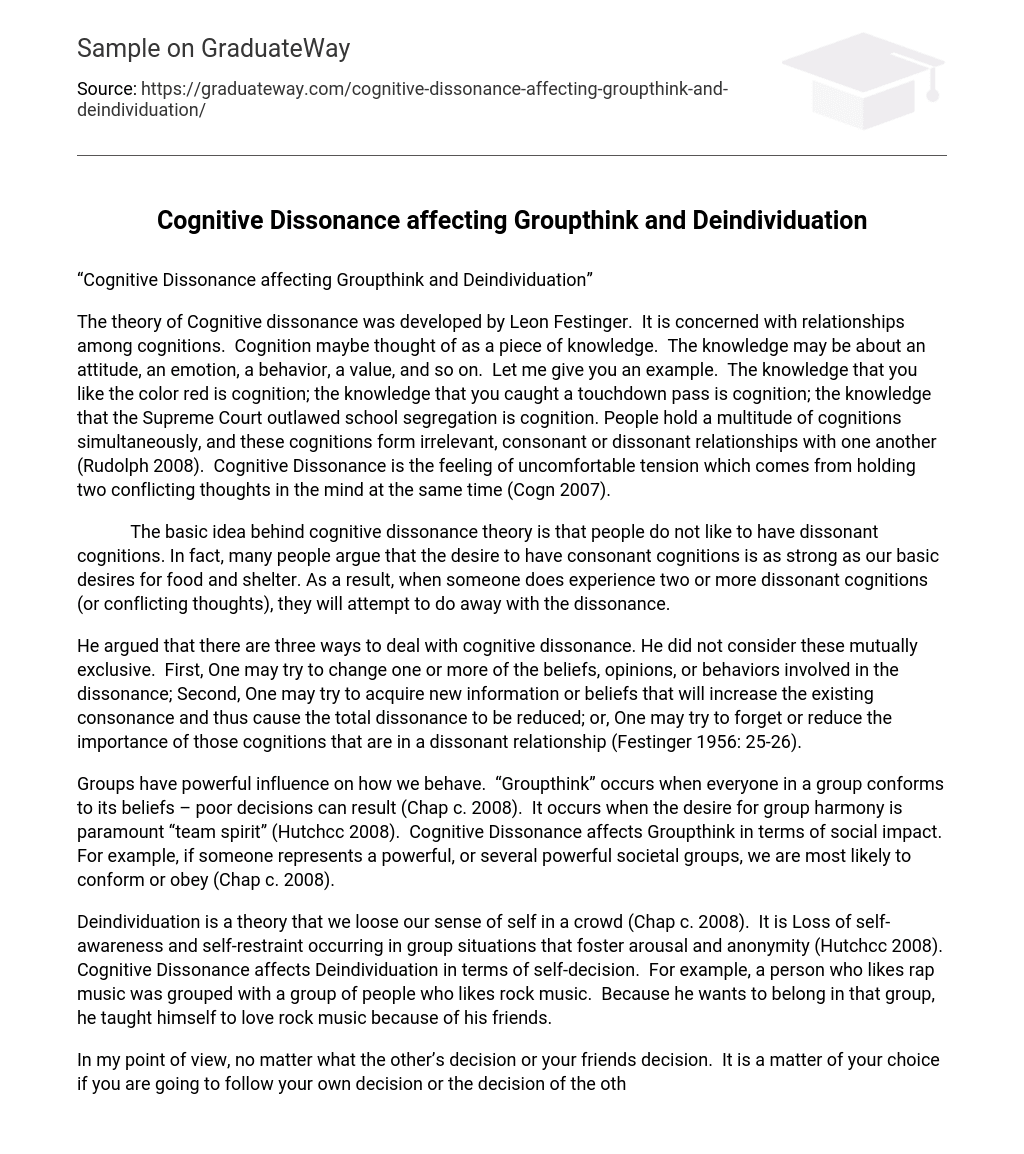The theory of Cognitive dissonance was developed by Leon Festinger. It is concerned with relationships among cognitions. Cognition maybe thought of as a piece of knowledge. The knowledge may be about an attitude, an emotion, a behavior, a value, and so on. Let me give you an example. The knowledge that you like the color red is cognition; the knowledge that you caught a touchdown pass is cognition; the knowledge that the Supreme Court outlawed school segregation is cognition. People hold a multitude of cognitions simultaneously, and these cognitions form irrelevant, consonant or dissonant relationships with one another (Rudolph 2008). Cognitive Dissonance is the feeling of uncomfortable tension which comes from holding two conflicting thoughts in the mind at the same time (Cogn 2007).
The basic idea behind cognitive dissonance theory is that people do not like to have dissonant cognitions. In fact, many people argue that the desire to have consonant cognitions is as strong as our basic desires for food and shelter. As a result, when someone does experience two or more dissonant cognitions (or conflicting thoughts), they will attempt to do away with the dissonance.
He argued that there are three ways to deal with cognitive dissonance. He did not consider these mutually exclusive. First, One may try to change one or more of the beliefs, opinions, or behaviors involved in the dissonance; Second, One may try to acquire new information or beliefs that will increase the existing consonance and thus cause the total dissonance to be reduced; or, One may try to forget or reduce the importance of those cognitions that are in a dissonant relationship (Festinger 1956: 25-26).
Groups have powerful influence on how we behave. “Groupthink” occurs when everyone in a group conforms to its beliefs – poor decisions can result (Chap c. 2008). It occurs when the desire for group harmony is paramount “team spirit” (Hutchcc 2008). Cognitive Dissonance affects Groupthink in terms of social impact. For example, if someone represents a powerful, or several powerful societal groups, we are most likely to conform or obey (Chap c. 2008).
Deindividuation is a theory that we loose our sense of self in a crowd (Chap c. 2008). It is Loss of self-awareness and self-restraint occurring in group situations that foster arousal and anonymity (Hutchcc 2008). Cognitive Dissonance affects Deindividuation in terms of self-decision. For example, a person who likes rap music was grouped with a group of people who likes rock music. Because he wants to belong in that group, he taught himself to love rock music because of his friends.
In my point of view, no matter what the other’s decision or your friends decision. It is a matter of your choice if you are going to follow your own decision or the decision of the others.
Reference:
Rudolph, Frederick M. “General Experimental Psychology Cognitive Dissonance Lab: The theory of cognitive dissonance”. C. 2008. <http://www.ithaca.edu/faculty/stephens/cdback.html>.
Festinger Leon. When Prophecy Fails: A Social and Psychological Study (Harpercollins 1964). (Originally published in 1956 by the University of Minnesota Press.)
“Cognitive Dissonance”. Syque. 2007. <http://changingminds.org/explanations/theories/cognitive_dissonance.htm>.
Bezroukov, Nikolai. Softpanorama. 24 April 2008. <http://www.softpanorama.org/Skeptics/groupthink.shtml >.
“CHAPTER 10: COGNITION AND SOCIAL BEHAVIOR”. Uwosh. C.2008 <www.uwosh.edu/departments/psychology/coursematerials/module 3.pdf >.
“Chapter 15: Social Psychology”. Hutchcc. C. 2008. <www.hutchcc.edu/faculty/coplenm/marywebsupport/ch15sp04.ppt >.





